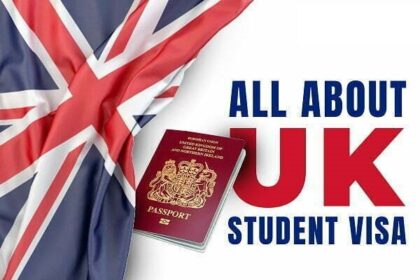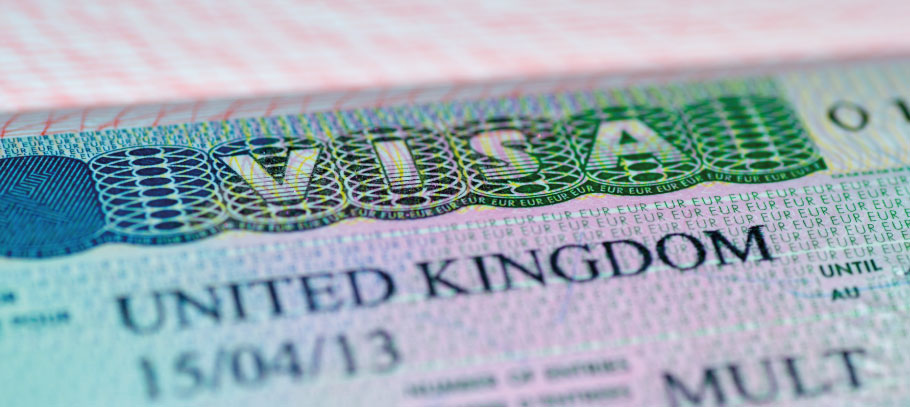
All international students who want to study in the UK are required to get a student visa (Tier 4). This type of visa is only available to full-time university students pursuing a degree in the UK, and not short-term or language courses.
Anyone who is planning to study in UK is required to have a visa in order to stay in the country for an extended period of time. Immigration requirements for UK (and the United Kingdom as a whole) are determined by your nationality and the country(ies) that you have citizenship in. This part of the guide will focus on giving you a general idea of the guidelines for getting a visa for study in UK.
How to apply for a student visa in UK?
The application for a student visa in UK can be carried online, by post or in person. Note that you can apply online only from outside of the UK, Channel Islands and the Isle of Man (except North Korea). Those who are residing in UK at the time of application must apply in person or by post.
What documents do I need?
Always have in mind that visa restrictions and requirements in the UK change regularly. Therefore, you must always check the official visa policy guidelines before initiating an application.
Currently, your student visa application requirements in UK change based on your citizenship and the type of visa you’re applying for. Depending on your purpose of visit in the UK whether it is for health issues, studying, familiar union and so forth, you need to seek a proper visa and particular visa requirements.
If you want to find out what are the requirements for different UK visa types, check visaguide.world.
Frequently Asked Questions About UK Student Visa
When can I apply?
You can apply for your student visa in UK 3 months before your course starts. Once you submit a university application you’ll receive (or you can request it) a Confirmation of Acceptance for Studies. This document will entitle you as an admitted student in UK and therefore you’re eligible to seek a visa. Use the CAS number to support your student visa application form.
Can I work while studying in UK?
Yes, you can. Under current legal regulations in the UK you are allowed to find a part-time job while studying. As a government-sponsored international student who attends a course for 6 months or longer, you’re allowed to work up to 20 hours per week. However, make sure your university is listed on the list of recognized higher education providers in the UK. At this link is the full list of these recognized bodies.
Can I bring my relatives in UK with my student visa?
You can, but there are some restrictions and exemptions applied you must be aware of. As a government-sponsored student, you can bring in UK your dependents if you’re enrolled in an undergraduate course longer than 6 months or in a postgraduate course longer than 12 months at a recognized university.
First, you need to know what is regarded as a dependent. Your spouse/wife and children are considered as your Tier 4 dependents. Other relatives are not.
Next, your dependent must prove good financial resources in order to be given the right to come in UK as your dependent. The amount of money required in this case can be held by you or by your dependent.
Your dependent can work in UK under these circumstances
-
You’re attending an undergraduate degree course longer than 6 months or a postgraduate degree course longer than 12 months.
-
A newly introduced rule in the UK states that those dependents who submit an immigration application on or after 06 July 2018 will be allowed to work even if your course is longer 9 months or longer.
How much does it cost to get a student visa in UK?
Naturally, applying for a UK student visa carries a certain fee which may depend on your nationality and the type of visa you’re willing to get. Furthermore, the student visa fee scheme changes from time to time so you must always check the official sources.
If you apply from outside the UK for a Tier 4 Student visa you will need to pay £335. If you’re applying from within the UK the following prices may apply to you
-
Standard service – £457
-
Priority service – £916
-
Premium service – £1047
Note: A charge for your membership at the Immigration Health Service is included.
At this link, the UK’s governmental site shows the exact cost of applying for a visa in UK, including student visas. Just select your country from where you’re applying, the type of visa you want to get and the purpose of your visit in UK and there it is.
How to get a work visa after studies in UK
If you’re thinking to remain in the UK for a certain period after getting your degree there are various options for you. As long as your student visa is valid you’re allowed to find a full-time job and work in the UK. After your visa expires, you must contact the Home Office if you want to extend its validity.
However, there are some restrictions, you must be aware of. These are the types of job you’re not allowed to seek
-
A permanent full-time job
-
Self-employed or Freelancer
-
A doctor in Training, Coach, sportsperson or entertainer (except in a certified Foundation Program)
Below are given some of the ways you can extend the duration of your staying in UK by seeking a proper visa.
Tier 4 Doctorate Extension Scheme – Students that are at the final stage of completing their PhD in UK and are thinking to find a job or establish a business can seek an extension for up to 12 months. To get this visa a sponsorship from your university is required.
Tier 2 (General) – The most common route to immigrate and work in the UK is by taking a Tier 2 (General) visa. You can only seek this visa if there’s a Tier 2 licensed employer who’s offering you a job. This type of visa is valid for up to 5 years.
Tier 1 Graduate Entrepreneur – If you have an idea to set a business in UK, you can get a Tier 1 visa. You don’t need a sponsorship for this visa, but an approval from the University or UK Trade and Investment is required. Its validity lasts for 12 months and after that, you can ask for another extension of 12 months.
UK Ancestry – If your grandparent was born in UK and you want to work in UK you can get such a visa. Its validity lasts for 5 years.
As the current rules state, your University must inform the Home Office if it’s aware that you’re not respecting the conditions and terms of your Tier 4 visa.
The European Union, European Economic Area (EEA) or Swiss Citizens:
If you have a passport from one of the countries below, then you do not need a visa in order to study in the UK. This also includes those who have dual nationalities (two or more) who use an EEA/EU/Swiss Passport in order to get into the country.
-
Austria
-
Belgium
-
Bulgaria
-
Croatia
-
Republic of Cyprus
-
Czech Republic
-
Denmark
-
Estonia
-
Finland
-
France
-
Germany
-
Greece
-
Hungary
-
Iceland
-
Ireland
-
Italy
-
Latvia
-
Liechtenstein
-
Lithuania
-
Luxembourg
-
Malta
-
Netherlands
-
Norway
-
Poland
-
Portugal
-
Romania
-
Slovakia
-
Slovenia
-
Spain
-
Sweden
Non-EU/EEA/Swiss nationals
If you are looking to come to UK to study abroad, you will need a visa. There are two categories of nationalities that the UK Border Control has, and you will have to determine which you fall under before you can know how to apply. Your visa application will also be based on what you’re studying and how long you plan to stay in UK.
Visa Nationals:
Visa nationals are those who are citizens of the countries that are included in this list (which can also be found on the UKBA website).
-
Afghanistan
-
Albania
-
Algeria
-
Angola
-
Armenia
-
Azerbaijan
-
Bahrain
-
Bangladesh
-
Belarus
-
Benin
-
Bhutan
-
Bolivia
-
Bosnia Herzegovina
-
Burkina Faso
-
Burma
-
Burundi
-
Cambodia
-
Cameroon
-
Cape Verde
-
Central African Republic
-
Chad
-
People’s Republic of China (unless they hold a passport issued by Hong Kong Special Administrative Region or Macao Special Administrative Region)
-
Colombia
-
Comoros
-
Congo
-
Cuba
-
Democratic Republic of the Congo
-
Djibouti
-
Dominican Republic
-
Ecuador
-
Egypt
-
Equatorial Guinea
-
Eritrea
-
Ethiopia
-
Fiji
-
Gabon
-
Gambia
-
Georgia
-
Ghana
-
Guinea
-
Guinea Bissau
-
Guyana
-
Haiti
-
India
-
Indonesia
-
Iran
-
Iraq
-
Ivory Coast
-
Jamaica
-
Jordan
-
Kazakhstan
-
Kenya
-
Korea (North)
-
Kosovo
-
Kuwait
-
Kyrgyzstan
-
Laos
-
Lebanon
-
Lesotho
-
Liberia
-
Libya
-
Macedonia
-
Madagascar
-
Malawi
-
Mali
-
Mauritania
-
Moldova
-
Mongolia
-
Montenegro
-
Morocco
-
Mozambique
-
Nepal
-
Niger
-
Nigeria
-
Oman
-
Pakistan
-
Palestinian Territories
-
Peru
-
Philippines
-
Qatar
-
Republic of South Sudan
-
Republic of Sudan
-
Russia
-
Rwanda
-
Sao Tome e Principe
-
Saudi Arabia
-
Senegal
-
Serbia
-
Sierra Leone
-
Somalia
-
South Africa
-
Sri Lanka
-
Sudan
-
Surinam
-
Swaziland
-
Syria
-
Taiwan (unless they hold a Taiwan passport which includes the number of the identification card issued by the competent authority in Taiwan)
-
Tajikistan
-
Tanzania
-
Thailand
-
Togo
-
Tunisia
-
Turkey
-
Turkmenistan
-
Uganda
-
Ukraine
-
United Arab Emirates
-
Uzbekistan
-
Vatican City
-
Venezuela (unless they hold a Venezuelan passport which contains biometric information held in an electronic chip)
-
Vietnam
-
Yemen
-
Zambia
-
Zimbabwe
-
The territories formerly comprising the socialist Federal Republic of Yugoslavia
If the country you are a citizen of is on this list, here is what you have to do in order to study in UK.
-
You have to obtain your visa prior to arriving in UK.
-
If you plan to be in the country for 6 months or more or you want to work in UK (either as an unpaid internship or in order to make a living), you must obtain what is called a Tier 4 (general) student visa.
-
If you are not working and you are staying for less than 6 months, then you may get either a student visitor visa or a Tier 4 (General) student visa.
Non-visa Nationals:
If your country of citizenship is not on either one of the above lists (visa national or EU/EEA/Swiss), then you are considered a non-visa national. Here is what you must do in order to study in UK.
-
You have to obtain your visa prior to arriving in UK.
-
If you plan to be in the country for 6 months or more, or you want to work in UK (either as an unpaid internship or in order to make a living), you must obtain what is called a Tier 4 (general) student visa.
-
If you are in the country for less than 6 months, and are not working, then you can apply for entry to the UK as a student visitor.




